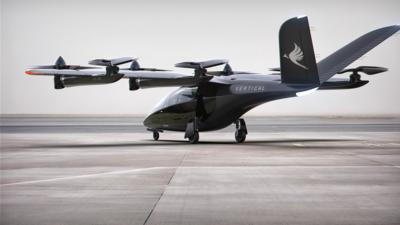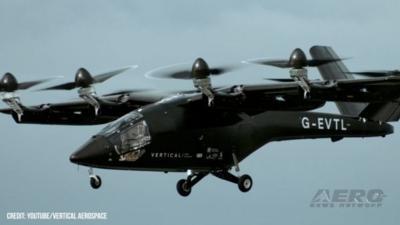Mon, Sep 16, 2024
Company Now Working With UK CAA for Flight Permit
Vertical Aerospace, a Bristol-based technology company working towards zero-emissions aviation, recently completed Phase I testing of its VX4 prototype. They are now working with the UK’s Civil Aviation Authority (CAA) to start untethered tests.

“It took us just one week to go from our first ground test to our chief test pilot flying the VX4, and we have been making outstanding progress since then,” commented Vertical Aerospace CEO Stuart Simpson. “We continue to prove the safety and performance of our design and technology, which we believe to be market-leading."
The Vertical VX4 features a 20% power-to-weight ratio increase from the previous model, allowing it to reach cruise speeds of 150 mph. It is a crewed Electric Vertical Take-Off and Landing (eVTOL) aircraft that can carry up to four passengers with “zero emissions.”
Phase I testing included multiple piloted tethered flights and ground runs for a total of 20 sorties at the Vertical Flight Test Center. These included Ground Vibration Testing (GVT), propeller spinning and balancing, parts checks, and a High Voltage (HV) ripple test. The company also analyzed the aircraft’s performance in run-up, taxi, tethered flight, and Electric Propulsion Unit (EPU) failure to ensure safety outside of its normal operation range. Vertical engineers collected and measured system parameters to verify that all systems were working correctly.

Vertical is continuing discussions with the UK CAA to prepare for Phase 2 testing. This will involve crewed VTOL and low-speed maneuver operations in thrustborne flight. Then, if successful, they will move into Phase 3 to test wingborne lift. Phase 4 will evaluate the shift from thrustborne to wingborne flight and back.
“Completing this first phase of testing is a significant feat for any eVTOL company and shows the strength of our aircraft, team, and our partners as we progress through our flight test program and head towards our goal of creating a better way to travel,” Simpson continued.
More News
Homing [ICAO] The procedure of using the direction-finding equipment of one radio station with the emission of another radio station, where at least one of the stations is mobile, >[...]
Aero Linx: European Regions Airline Association (ERA) The European Regions Airline Association (ERA) represents a diverse membership of over 50 airlines and more than 150 associate>[...]
A Few Questions AND Answers To Help You Get MORE Out of ANN! 1) I forgot my password. How do I find it? 1) Easy... click here and give us your e-mail address--we'll send it to you >[...]
While On Short Final, About 300 Ft, The Pilot Performed A Forced Landing Near Trees On September 7, 2025, about 0932 eastern daylight time, a CubCrafters Carbon Cub EX airplane, N4>[...]
Severe Icing The rate of ice accumulation is such that ice protection systems fail to remove the accumulation of ice and ice accumulates in locations not normally prone to icing, s>[...]
 ANN's Daily Aero-Term (10.13.25): Homing [ICAO]
ANN's Daily Aero-Term (10.13.25): Homing [ICAO] ANN's Daily Aero-Linx (10.13.25)
ANN's Daily Aero-Linx (10.13.25) ANN FAQ: Q&A 101
ANN FAQ: Q&A 101 NTSB Prelim: CubCrafters Carbon Cub
NTSB Prelim: CubCrafters Carbon Cub ANN's Daily Aero-Term (10.14.25): Severe Icing
ANN's Daily Aero-Term (10.14.25): Severe Icing




